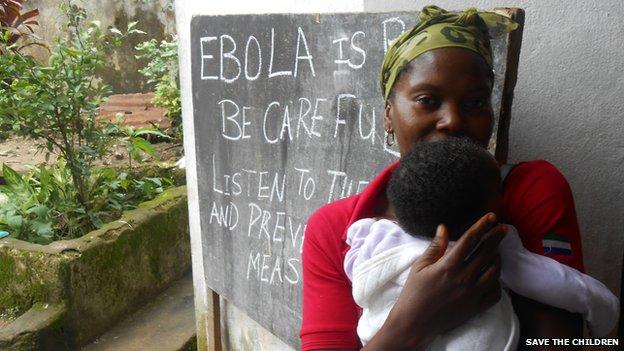UK Ebola survivor William Pooley tells of virus 'horror'
- Published
British nurse William Pooley speaks of "the horror and misery" of death from Ebola in Sierra Leone
The British nurse who contracted the Ebola virus in Sierra Leone has called for action to stop the "horror and the misery" he witnessed there.
Recalling his "despair" at the death of a young girl he treated, William Pooley said: "I just don't know what happens if that's repeated a million times."
The 29-year-old was speaking during a summit in London to discuss the global response to the crisis.
It is the world's worst outbreak of the virus, killing 3,338 people so far.
There have been 7,178 confirmed cases, with Sierra Leone, Liberia and Guinea suffering the most.
Charity Save the Children warned that Ebola is spreading across Sierra Leone at a "terrifying rate".
Experts and politicians from around the world at the summit in central London, where countries and charities have pledged their support to efforts to try and tackle the virus.
The UK has called for urgent decisive action to deal with growing epidemic.
Mr Pooley, who was the first Briton to contract the virus during the current outbreak, appealed to the international community to act to prevent the epidemic getting worse.
'Well of my despair'
In an emotional press conference he spoke about the death of a young girl and her brother.
He said he had found her "covered in blood," adding: "She still had a very puzzled expression on her face and she wasn't breathing."
"So I put her in a bag and left her next to her brother. She was a beautiful little girl," he said.
"So, my specific fear is that the horror and the misery of these deaths, really fill a well of my despair.
"And I just don't know what happens if that's repeated a million times. And so I say, at all costs, we can't let that happen."

There have been 7,178 confirmed cases, mainly in Sierra Leone, Liberia and Guinea
The volunteer nurse, from Eyke in Suffolk, was flown back to the UK by the RAF on Sunday 24 August having contracted the virus while treating patients in Sierra Leone.
He was treated in a special isolation unit at the Royal Free Hospital, where he was given the experimental drug ZMapp.
Mr Pooley, who has made a full recovery, has previously said he plans to return to Africa, saying his decision to return was an easy one.
NHS staff
Among the pledges made at the London conference was $70m (£43m) from Save the Children, of which $40m had been earmarked for Sierra Leone.
Comic Relief has pledged £1m, while more than 160 NHS staff are due to travel to Sierra Leone after answering a call for volunteers to help fight the disease earlier this month.
Mr Pooley said pledges need to be delivered "really quickly", saying: "We need beds and we need people looking after the patients in the beds."
Foreign Secretary Philip Hammond said Mr Pooley, who recently returned from the US where he gave blood to try to help a victim of the virus, was an example of the "courage" and resilience needed to tackle the crisis.

Ebola virus disease (EVD)

Symptoms include high fever, bleeding and central nervous system damage
Spread by body fluids, such as blood and saliva
Fatality rate can reach 90% - but current outbreak has mortality rate of about 55%
Incubation period is two to 21 days
There is no vaccine or cure
Supportive care such as rehydrating patients who have diarrhoea and vomiting can help recovery
Fruit bats, a delicacy for some West Africans, are considered to be virus's natural host
